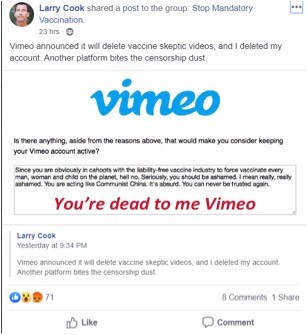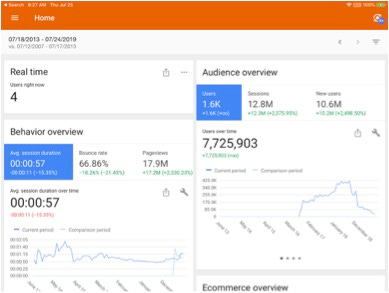Part 2 || Terrifying Technofascist Acts Against Health Freedom
Google Is Now Manufactured & Processed
This story was updated and was originally published in July 2019
Follow: Twitter | Instagram | Telegram | Gab | Facebook
Truth Lives Here: Rumble | Rokfin | Odysee | Brighteon | Bitchute | YouTube
Websites: MaryamHenein.com | HoneyColony.com
Read The Ingredients: Google Is Now Processed & Non-Organic
Prior to the P$andemic, many of us began getting censored for simply engaging in an educated conversation about vaccines. The ironic thing is that pro-vaxxers are usually ill-informed, brainwashed, or scientifically illiterate. Scientism is not science.
“It’s really scary what is happening,” says one health influencer who wished not to be named. So many are being shut out of Google, and now Vimeo is rejecting [anti] vaccine content. Mailchimp is shutting down accounts and keeping the lists of people who email about anti-vaccine. The lengths they go.”
In early July 2019, Vimeo announced that it would no longer publish sites critical of vaccines or that question vaccine safety. Here’s more about vaccine censorship.
Facebook, whose committee members include former Big Pharma employees, also censored legitimate scientific inquiry and debate regarding vaccine safety.
The “V” word was arguably a linchpin, the Great Divider.
Big Pharma’s tentacles—full of suction and sway—was beginning to extend to Big Tech to prohibit the sharing of (health) information. Google, for instance, has a clear agenda that serves pharmaceuticals, and its success is now directly built into its search algorithms.
In a recent episode, podcast host Joe Rogan told Jesus Hotep that social media platforms “want you to tow a line.”
Back in the good ole’ days, organic search results closely matched the user’s search query. The algorithm was based on relevance and popularity unless you paid Google extra to get listed on top as an obvious ad—just like you need to fork over more money if you want a beloved’s crypt to be stored at eye level in a mausoleum.
Popular veritable search terms helped connect Googlers with the information they were actually looking for. This, in turn, spurred writers to pivot and employ search engine optimization—such as keywords—when crafting content online.
By June 2016, my online magazine and marketplace HoneyColony—whose mission is to empower you to be your own health advocate—was getting about 500,000 unique visitors a month, according to Google Analytics. We were genuinely and organically garnering interest and offering value with solid, well-researched articles.
Until we weren’t.
What happened? Google changed its algorithms.
Updates on Google aren’t new. The company has gone through thousands of updates throughout its existence. And every once in a while, it rolls out a major algorithmic update. But until now, there’s been nothing as sinister as the recent changes, which apparently are powerful enough to do serious damage to a health-oriented site’s revenue alongside the site’s organic traffic. Unless those sites tow the line, of course.
In the past, Google has said:
“As with any update, some sites may note drops or gains. There’s nothing wrong with pages that may now perform less well. Instead, it’s that changes to our systems are benefiting pages that were previously under-rewarded.”
However, many sites, like HoneyColony.com, witnessed a slow, sneaky purge, and now crowdsourced relevance is seemingly irrelevant. In short, Google—and other tech companies—are exercising more and more control over what pops up when you search.
Google’s “Medic Update” was instituted in August 2019. Traffic to HoneyColony.com dwindled by 30 percent. We scratched our heads during marketing meetings, wondering what we were doing wrong based on Google’s standards. Then, we learned we had been impacted by what would be referred to as the “Medic Update.”
Google described the change as a “broad, global, core update.” However, according to Search Engine Land, upon further analysis from SEO consultants, the focus of the changes made under the “Medic Update” centered around the medical and health space, as well as “Your Money Your Life” types of sites that generate revenue by making your life better.
“This specific focus is something Google will not confirm,” said Search Engine Land.







